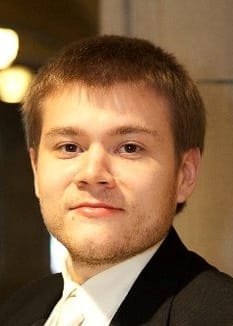Brief Bio
Michael Opferman earned his B.S. in Engineering Physics, and his M.S. and Ph.D. in Physics from the University of Pittsburgh. His undergraduate research included modeling the nucleation of phase transitions with Prof. Anna Vainchtein, and his graduate work began with simulations of long, flexible objects such as quantized flux lines and DNA molecules with Prof. Yadin Goldschmidt. His dissertation research, with Prof. Rob Coalson and Prof. David Jasnow, involved using polymer physics and Langevin dynamics simulations to explore the binding of natively unfolded proteins to transport receptors that control passage in and out of the cell nucleus. This work involved a close collaboration with Prof. Anton Zilman, who was then at Los Alamos National Laboratory, where Michael spent his summers. After receiving his Ph.D. in 2013, he became a Lecturer at the University of Pittsburgh. He joined Temple University as Assistant Professor of Instruction in 2015.
Research Interests
My research interests have mainly been in the area of polymer brushes and grafted polymer films, especially as they occur in the biopolymers of the Nuclear Pore Complex.
Key Publications
- M. G. Opferman, R. D. Coalson, D. Jasnow, and A. Zilman. "Morphological Control of Grafted Polymer Films Via Attraction to Small Nanoparticle Inclusions". Phys. Rev. E. 86, 031806 (2012).
- M. G. Opferman, R. D. Coalson, D.Jasnow, and A. Zilman. "The Morphology of Polymer Brushes Infiltrated by Attractive Nanoinclusions of Various Sizes". Langmuir 29, 8584 (2013).
- A. Vovk, C. Gu, M.G. Opferman, L.E. Kapinos, R.Y.H. Lim, R.D. Coalson, D. Jasnow, and A. Zilman. "Simple biophysics underpins collective conformations of the intrinsically disordered proteins of the Nuclear Pore Complex". eLife 5, e10785 (2016)

